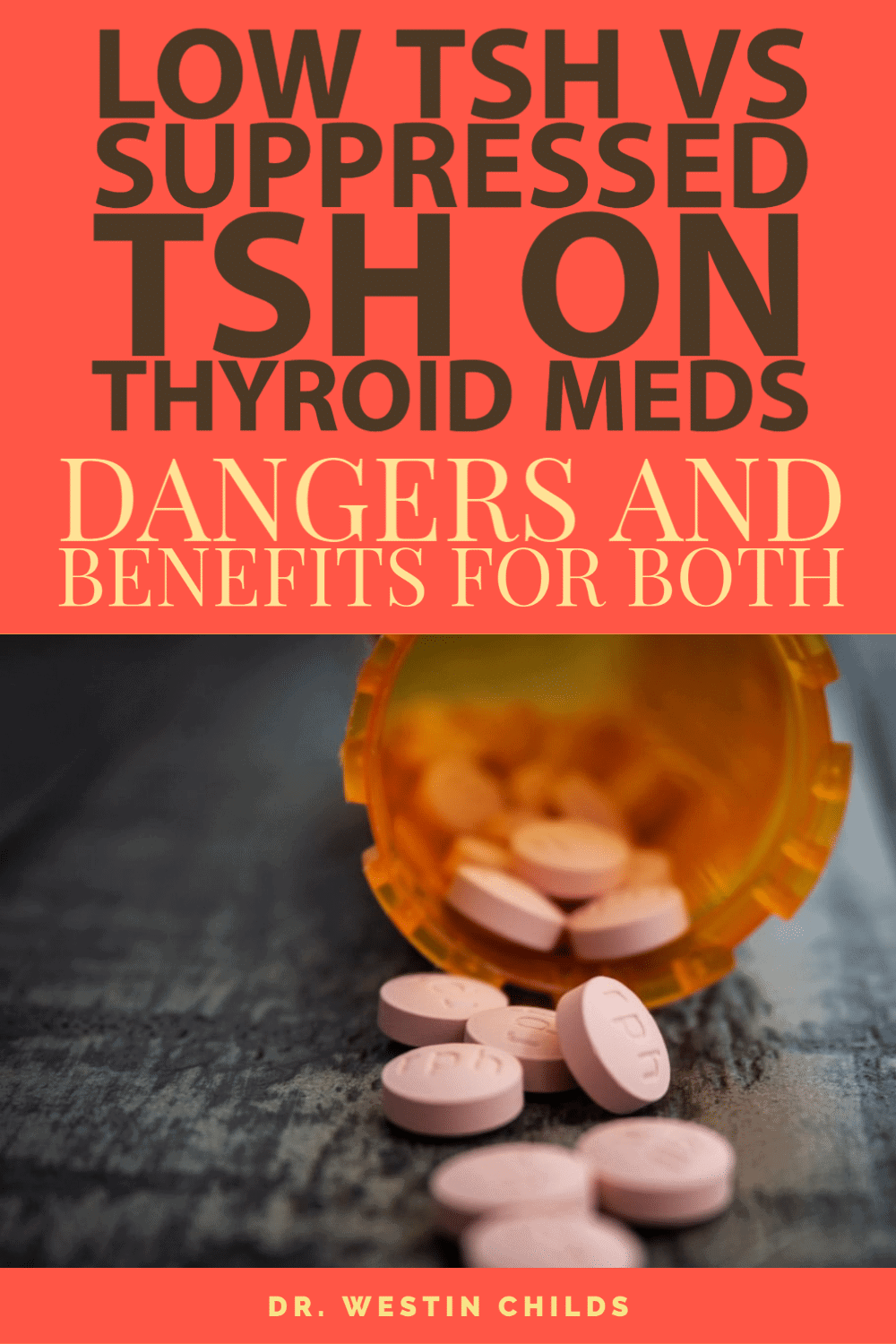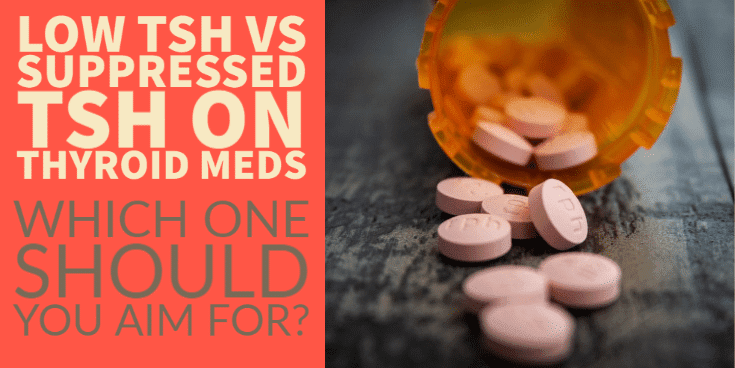As a thyroid patient, there is no doubt in my mind that you are already familiar with the thyroid lab test known as the TSH.
It would be weird if you didn’t.
Doctors primarily use the TSH test as a way to measure how well your thyroid gland is working.
But there’s one big problem with that…
It doesn’t work nearly as well as they think and probably not nearly as well as you think.
If you are someone who is relying SOLELY upon the TSH as a means to determine whether or not your thyroid medication is ‘adequate’ then you are most likely making a huge mistake.
Today we are going to talk about just that.
We will be covering…
- How your thyroid medication impacts your TSH
- Why the TSH isn’t the best measure of thyroid function in your body
- The difference between a low TSH and a suppressed TSH
- Why lowering your TSH is probably not a big deal in the long-term
- And more…
Let’s jump in…
Before we do, though, you need to know that this information primarily applies to people who are taking thyroid medication.
It does not necessarily apply to people who have a low or suppressed TSH without using these thyroid medications.
Conditions in which your own body suppresses your TSH naturally are considered on the hyperthyroid spectrum.
This information applies to people with LOW THYROID who are ALSO taking thyroid medication.
DOWNLOAD FREE RESOURCES
Foods to Avoid if you Have Thyroid Problems:
I’ve found that these 10 foods cause the most problems for thyroid patients. Learn which foods you should avoid if you have thyroid disease of any type.
The Complete List of Thyroid Lab tests:
The list includes optimal ranges, normal ranges, and the complete list of tests you need to diagnose and manage thyroid disease correctly!
What is a Suppressed TSH?
For starters, we should talk about the exact definition of a suppressed TSH.
A suppressed TSH is the thing that your doctor is so afraid of when adjusting your thyroid medication.
In fact, I’m sure you’ve experienced a situation similar to this:
Your doctor increases your dose of thyroid medication only to find that your TSH went down farther than expected.
You feel great on this new dose of thyroid medication but your doctor is worried about your health and they say that having a low TSH is dangerous they lower your dose.
All of your symptoms are back but you are told that you are now “safe”.
Does this sound familiar?
This is pretty standard for doctors, including endocrinologists.
But, as I mentioned above, there’s one huge problem with this method of thinking about the TSH.
It’s just flat-out wrong.
But we will get to that later.
Doctors are afraid of giving you too much thyroid medication because they fear that you will become “suppressed”.
This idea refers to giving you enough thyroid medication that it lowers your TSH to a point that it is no longer detectable.
In physiologic terms, it means that your brain is no longer sending signals to your thyroid gland to produce more thyroid hormone.
When your TSH is suppressed, you are nearly 100% reliant upon thyroid medication to provide thyroid hormone to your body and cells.
So what’s the big deal with this state?
Doctors are afraid that suppressing your TSH will cause two major conditions:
#1. Osteoporosis.
And #2. Atrial fibrillation.
They also believe that if your TSH is suppressed or too low this is an indication that you are “hyperthyroid”.
As you will soon see, neither of these things is true.
What a Suppressed TSH Means
On the contrary, it’s actually quite possible for you to have a suppressed TSH and still have LOW THYROID symptoms.
And you probably know what I am talking about if you’ve ever had a suppressed TSH.
This is quite common by the way, with studies showing that at any given time as many as 30% of thyroid patients have been suppressed at some point in their life.
But let me ask you a question…
When you had a low or suppressed TSH did you feel hyperthyroid? Did you suddenly lose a bunch of weight or find that you were jittery or that your hands wouldn’t stop shaking?
Did you experience ANY of the symptoms of hyperthyroidism?
Or did you continue to have low thyroid symptoms such as weight gain, fatigue, hair loss, constipation, and depression?
I can almost guarantee that most of you experienced more of the latter.

And the reason is simple:
A suppressed TSH does NOT automatically mean that you are hyperthyroid (1)!
Let me make this as clear as possible:
It’s not possible for you to magically be hyperthyroid but NOT notice it.
You can not be hyperthyroid without having the symptoms of that condition.
If you do NOT have the symptoms then you are not hyperthyroid.
I know this topic can be confusing because I see comments from thyroid patients on a daily basis.
They are often quite confused because they are told they are hyperthyroid, due to their TSH level, while they experience nearly every hypothyroid symptom in the book.
These two things are not compatible with one another.
You are either hypothyroid or hyperthyroid, not both, and you can only be one.
The best way to figure this out is by looking directly at your symptoms (and a complete range of lab tests that includes more than just the TSH).
Degrees of TSH Suppression
Another important thing for you to understand is that not all flavors of TSH suppressed are created equal!
Let me give you an example.
Consider a thyroid patient who is taking 100mcg of levothyroxine (the weakest thyroid medication available).
With this dose, this hypothetical person has a TSH of 0.5 and is still not feeling well.
Now let’s suppose that we increase that dose of levothyroxine up to 200mcg per day.
This person’s TSH then drops down to an unnoticeable level and they are considered to have a suppressed TSH.
Now let’s take that same person and increase their dose by another 100mcg so now they are taking a total of 300mcg per day.
Does the TSH go any lower than it already was?
No, because it’s already suppressed.
But the impact that the 300mcg of levothyroxine has on the body is different from the impact that the 200mcg dose of levothyroxine has.
And yet we consider both of these patients in the same “category”.
You can also apply this thought experiment using other thyroid medications such as Cytomel.
The point here is that you can suppress the TSH using different types of medications and doses and they are NOT all the same.
The risks associated with suppressing a TSH with 300mcg are much higher than those associated with 200mcg.
And the risks associated with suppressing a TSH with 200mcg of Cytomel are much higher than those associated with 100mcg of Cytomel and so on.
There are some real POTENTIAL risks when suppressing the TSH but they are certainly not guaranteed.
What is a Low TSH?
This next part is very important if you are a thyroid patient.
I spent a lot of time talking about suppressed TSH, and there are some risks involved if you fall into that category.
But there are virtually NO downsides and no long-term consequences to only lowering your TSH.
But here’s the problem:
Doctors are just as afraid of a low TSH as they are of a suppressed TSH even though there is no evidence to suggest that a low TSH is harmful to thyroid patients.
In fact, there’s actually evidence to suggest that a LOW TSH is necessary for most thyroid patients to feel better.
The reason is complicated but has to do with the fact that the body doesn’t utilize thyroid medication the same way it uses thyroid hormone produced from a healthy thyroid gland.
So you actually need more thyroid medication for the body to use compared to what your own thyroid gland would produce naturally.
That’s a topic for another day, though!
Let me first define a low TSH for you.
I mentioned above that a low TSH is a TSH that is suppressed or non-detectable.
A low TSH is a detectable TSH but one that falls outside of the normal range that most lab tests provide.
Consider this example to help this sink in:
The standard range for a TSH test is usually somewhere between 0.5 and 4.5 uIU/mL.

A low TSH would be any TSH that falls BELOW 0.5.
So lab tests between 0.1 and 0.5 would be considered “low” but not suppressed because you can actually measure them.
A suppressed TSH will show up as something like <0.001 (which means that the value is less than the smallest amount detectable by the lab test).
A low TSH is not dangerous and does not mean that your thyroid medication is too high (necessarily)
A suppressed TSH does come with some associated risks.
For instance, there is a small risk of developing osteoporosis (2) and atrial fibrillation (3) (in certain populations).
But there are virtually no risks involved in simply LOWERING the TSH as described above.
Most doctors are afraid to do this, however, because they wrongly believe that a low TSH is indicative of a state of hyperthyroidism.
We already described why that isn’t true at all (in a previous section) and in fact, it may be necessary for your TSH to be low in order for you to get enough thyroid hormone in your body.
So when your doctor lowers your thyroid medication because your TSH is too low they are doing a disservice to you on several levels.
The first is that you might actually feel amazing on that higher dose of thyroid medication and the second is that they have tricked you into thinking what you are doing is dangerous.
What Should Your TSH “Goal” Be?
Is it possible to find the “perfect” TSH?
Or put another way, what should your “goal” TSH be?
Unfortunately, there is no straightforward way to answer this question.
I’ve seen thousands of thyroid lab tests from thyroid patients over the last 5 years and I’ve seen people feel GREAT with a TSH of 3.0 and I’ve seen people feel GREAT with a TSH of 0.2 and everything in between.
If you are looking at the TSH as a way to measure how well your thyroid is working then you are using this lab test in the wrong way.
The TSH is simply a measure of how much TSH is being produced by your pituitary gland.
It is NOT a measure of total body thyroid function nor should it be used that way.
If you are using it this way then you are using it incorrectly.
And I don’t blame you for this, it’s most likely the fault of your doctor who has drilled the importance of this relatively unimportant thyroid lab test into your head.
So what should you do instead?
I would strongly suggest that you get a complete thyroid lab panel done whenever you order a TSH.
When you use both the TSH and other important thyroid lab tests such as free T3 and free T4, you get a much clearer picture of what is happening in your body.
If your doctor is ONLY ordering the TSH as a way to measure your thyroid then it may be time to find a new doctor!
Final Thoughts
There is a big difference between a low TSH and a suppressed TSH.
A suppressed TSH does carry with it some risks to your health but these risks are relatively small and not guaranteed in all people.
On the other hand, a low TSH may be necessary for many thyroid patients to actually feel better.
And this state of TSH is NOT associated with any harm to your body long-term.
A good goal to “aim” for would be a low but not suppressed TSH while adjusting your thyroid medication,
This will allow you to not only feel better but also mitigate or eliminate any risks involved in using too much thyroid medication.
Now I want to hear from you:
What level is your TSH currently at?
Do you have a low TSH or a suppressed TSH?
Are you experiencing any symptoms or problems?
If so, what issues are you having?
Is your doctor willing to order more than just the TSH or do you need to get a second opinion?
Leave your questions or comments below!
Scientific References
#1. https://www.sciencedirect.com/science/article/pii/S2214623719301528
#2. https://www.ncbi.nlm.nih.gov/pmc/articles/PMC6416151/
#3. https://pubmed.ncbi.nlm.nih.gov/22673318/


Leave a Reply